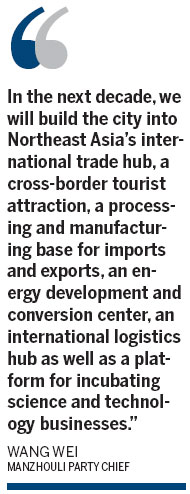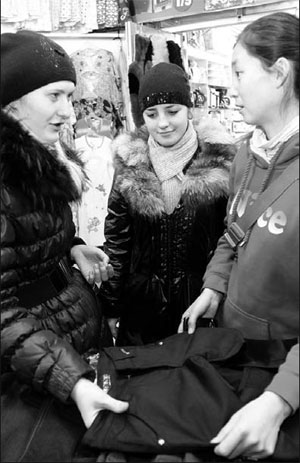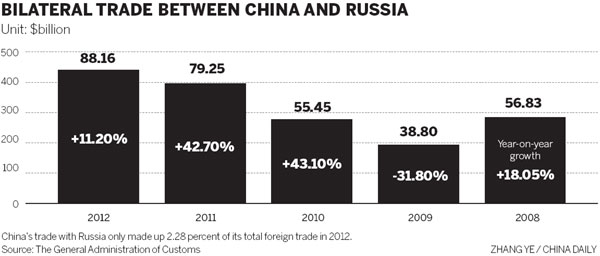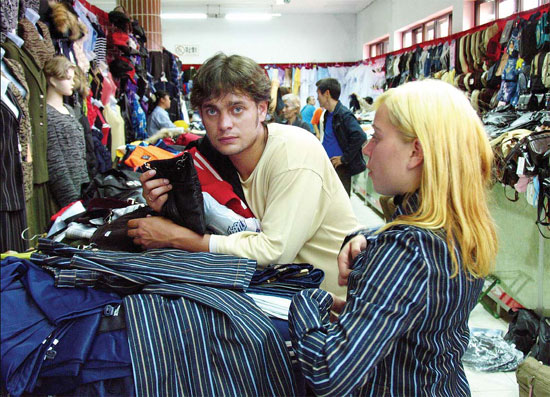China builds on border trade
Updated: 2013-03-04 07:50
By Li Jiabao in Beijing and Wang Kaihao in Manzhouli, Inner Monglia (China Daily)
|
||||||||
|
Two Russian businesspeople in a garment market in Manzhouli in North China's Inner Mongolia autonomous region. Border trade has brought prominence to Manzhouli as China's largest inland port, accounting for about 70 percent of land trade between China and Russia. Amid deepening China-Russia ties, the city, with a population of 300,000 in 2012 and a size of 732 square kilometers, is experiencing a new boom. Liu Zhaoming / For China Daily |
Russia's entry to WTO creates huge opportunities for entrepreneurship
Russia's accession to the World Trade Organization and the consequent tariff reduction with China implies promising opportunities for Chinese businesses as border trade between the two countries is expected to boom.
"We have finished production for all the orders before May," said Ge Shengchun, general manager of Jasmine Glass Technology Co based in Manzhouli, a city in Northeast China's Inner Mongolia autonomous region that borders Russia to the north and Mongolia to the west.
Ge set up the 20,000-square- kilometer glass plant in 2008 with an investment of 250 million yuan ($40.05 million). About 90 percent of his products, including concave glass, frosted glass and armoured glass, were sold to Russia and cornered more than half of the markets in cities in the Russian Far East, including Chita, Ulan-Ude and Irkutsk.
"Our priority is not the Chinese market. We are diversifying out overseas markets to reduce risks. We will enter the Hungary market this year and may set up sales networks in South Asian countries such as India in the future," he said.
Another regional businessman, Yu Hongwei, deputy manager of Manzhouli Yiliya Fruits Trade Co, said: "Price is our biggest competitive edge. Our product quality is in the middle level."
The company exports about 40,000 tons of vegetables and fruits to Russia every year, about 10 percent of Manzhouli's total fresh food exports. Tomatoes account for the biggest share. A total of 320,000 tons of vegetables and fruits passed through the Manzhouli customs' Shibali port in 2012. A specially dedicated lane reduced the one-time hour-long passage to less than 20 minutes, according to the port's deputy director Liu Juan.
Border trade has brought prominence to Manzhouli as China's largest inland port, accounting for about 70 percent of land trade between China and Russia. Amid deepening China-Russia ties, the city, with a population of 300,000 in 2012 and a size of 732 sq km, is facing a new boom. China's determination to open up inland regions and Russia's accession to the WTO is set to improve trade and investment environments.
The two nations' bilateral trade saw an increase of 7.1 percent year-on-year to reach $7.68 billion in January, while China's exports rose 26 percent compared with the same month in 2012, according to the Ministry of Commerce.
Accession to WTO
Russia was accepted as the 156th member of the WTO on Aug 22, 2012, with a process of accession of more than 19 years.
At the end of the implementation period, the average tariff ceiling for Russian imported products will be lowered to 7.8 percent from the average 10 percent that was applied before accession. The average tariff ceiling for manufactured products will be 7.3 percent instead of 9.5 percent while the average tariff ceiling for agricultural goods will be 10.8 percent instead of the earlier average of 13.2 percent.
In addition, Russia has offered improved market access opportunities in certain areas of goods and in many service sectors, according to the WTO.

"After accession to the WTO, Russia started to scrap differentiated taxes in transportation, which discriminated against foreign goods, and enhanced transparency through removing the price determining mechanism of imported goods. It's very meaningful for high quality Chinese products with competitive prices to enter Russia," Wang Junwen, president of China Association of International Trade, said during a forum on Jan 17 in Boao, Hainan province.
"The mentality and attitudes of Russian businessmen are changing after the accession to the WTO and trade areas are expanding. Chinese exports, occupying the middle- and low-end of Russia markets with price advantages will expand. We also see an enlarging import inventory and the prospect is bright for trade in gas, grain and minerals," Zou Jifeng, deputy mayor of Manzhouli, told China Daily.
Wang from the association pointed to promising China-Russia cooperation in high-tech sectors as Russia undergoes re-industrialization based on high technology and supported by rich resources and talent.
More than 70 percent of China's exports to Russia are now machinery and equipment products, the majority of which are complete sets of equipment products. The share is still expanding in view of Russia's robust demand for equipment in reforming industries and building up infrastructure such as power stations, according to Wang.
"It proves that accession to the WTO brings new opportunities for a country's economic development. Russia and China are highly complementary industrially. Russia did not set obstacles for Chinese industries and capital to enter Russia," said Oleg Soskovets, former first deputy prime minister of Russia, during the Boao forum.
The World Bank estimated that Russia's accession to the WTO will drive the nation's economy to grow by 3 percent while the US expects its exports to Russia will double in five years.
New boom
"Manzhouli is welcoming its second boom now as a leading player in China-Russia border trade," Gao Jian, chairman of China Development Bank Securities Co, told an investment promotion on Jan 16 in Beijing.
In July 2012, the State Council approved the establishment of a key development and opening-up experimental zone in Manzhouli. It also approved similar zones in Ruili, Yunnan province and Dongxing in Guangxi Zhuang autonomous region at the same time. Echoing the State Council's move, Inner Mongolia autonomous region also issued 38 favorable guidelines on Jan 9, regarding fiscal and taxation measures, port and passageway construction support and preferential policies in financing, industrial development, land use, public services and talent training.
Manzhouli experienced its first boom in 1992 when the State Council listed it among the first group of frontier cities for opening-up. A 70 sq km border economic cooperation zone was established in the city's northeast area in March 1992 that has now developed into the city's downtown area. A China-Russia mutual trade zone was also built in 1992 covering 0.2 sq km. It expanded to 138.8 sq km in 2004.
The past decade saw a boom in wood processing, fruit and vegetable storage and transportation, chemical construction materials and mechanical assembly as well as border tourism in Manzhouli. The city's foreign trade surged 73.37 percent annually from 1992 to 2011.
"In the next decade we will build the city into Northeast Asia's international trade hub, a cross-border tourist attraction, a processing and manufacturing base for imports and exports, an energy development and conversion center, an international logistics hub as well as a platform for incubating science and technology businesses," said the city's Party Chief Wang Wei.
"Although the 2008 global financial crisis constrained border trade value from expanding significantly, cargoes transported via the port have been steadily increasing," said Zou, deputy mayor of Manzhouli.
"Russia imports light industrial products, textile products, electronics as well as fruits from its biggest neighboring nation, while China imports resources such as oil and coal. Trade opportunities will surely increase amid strengthening political ties. The prospects are very bright," he said.
Positive development
A Russian woman bargaining with a Chinese clothes dealer in a shopping plaza in Raohe county, Heilongjiang province. After accession to the WTO, many Chinese economists believe China has more opportunities to increase its business relations with Russia in the years to come. Provided to China Daily

"China-Russia trade development is very positive in 2012 even in the face of the sluggish world economy," Sergey Sergeevich Razov, Russia's ambassador to China, told a news briefing on Dec 18.
Chinese exports through Manzhouli to Russia increased 18 percent year-on-year to $1.63 billion in 2012 while imports from Russia dropped 17.8 percent year-on-year to $4.17 billion, according to the General Administration of Customs.
However, China's trade with Russia, the world's ninth largest economy with a population of 143 million, accounted for just 2.28 percent of China's total foreign trade last year, which increased 6.2 percent year-on-year to nearly $3.87 trillion.
The two countries agreed to expand bilateral trade to $100 billion by 2015 and $200 billion by 2020. China was Russia's largest trade partner in 2011 and 2012 while Russia is China's trade partner with the fastest growth, Vice-Premier Li Keqiang told a trade and investment promotion in 2012.
Feng Yujun, an expert on Russian studies with the China Institutes of Contemporary International Relations, said the trade target can be attained in 2013 if the growth momentum continues. He added that trade structure improved in 2012 as Russian exports of technology and manufactured goods, rather than raw materials, significantly increased while Chinese exports of mechanical and electrical products expanded.
"Contrasting the expanding trade, mutual investment between China and Russia, although it is growing, is not satisfactory and does not match the economic potential of the two countries," Razov said.
China's investment in Russia rose 26.1 percent year-on-year to $716 million in 2011, about 1.04 percent of China's overall non-financial outbound investment in 2011, according to the Ministry of Commerce. The year 2012 saw Chinese investment in Russia jump 117.8 percent while China's non-financial overseas direct investment increased 28.6 percent year-on-year to $ 77.22 billion.
Russia's former first deputy prime minister Soskovets added that Russia is creating a better environment for foreign investment, including input from China.
"China can help Russia in both capital and manpower for Russia to make great progress and further develop the Far East region after its WTO accession. In addition, China's developed electronic and high-tech industries complement Russia's heavy industries well and there are already many Chinese companies joining hands with Russian companies to explore energy and forestry resources in the Far East region," said Soskovets.
Across the border, investments are also heating up in Manzhouli which "has been growing into a bridgehead for investments from China, Japan and the United States to enter the emerging Russian market", Zou said.
Challenges ahead
Wanda Group invested 1.5 billion yuan in 2012 to build a 100,000 sq m commercial plaza, including supermarkets, restaurants and KTVs, which will be put into use in 2014. Meanwhile Beijing Taiai Peptide Biological Engineering Technology Co inked a 1 billion yuan investment in a recent promotion to produce collagen peptide in Manzhouli out of raw materials from ox and sheep bones from Russia and Mongolia.
Russia's accession to the WTO does not necessarily mean the opening of a "golden door" to China because obstacles remain across the border.
"For all the difficulties of the accession process, it would be wrong to assume that the hard work is over. In fact, the main challenges lie ahead," WTO Director-General Pascal Lamy said in a speech in Moscow on Jan 18.
Fu Jianzhong, 62, chairman of Zhejiang Eternal Industry Group, saw the joint company, Khabarovsk Muxing Timber Co established by Fu and Heilongjiang State-owned Chenneng Trade Co in 2003, closed down in March 2007 by a local procuratorate in Russia for alleged timber stealing. Assets worth 15 billion yuan were auctioned following charges of failure to pay taxes while the 49-year business operation rights of a 247,000-hectare forest farm were taken back, Xinhua News Agency reported on Jan 4.
Russia pledged to enhance its business environment from the current 120th place ranked by the World Bank to 50th by 2015 and in the top 20 by 2018, according to a guideline from the Russian Presidential Press and Information Office in late December.
Contact the reporters at lijiabao@chinadaily.com.cn and wangkaihao@chinadaily.com.cn

(China Daily 03/04/2013 page13)

 In Photos: 7.0-magnitude quake hits Sichuan
In Photos: 7.0-magnitude quake hits Sichuan
 Li Na on Time cover, makes influential 100 list
Li Na on Time cover, makes influential 100 list
 FBI releases photos of 2 Boston bombings suspects
FBI releases photos of 2 Boston bombings suspects
 World's wackiest hairstyles
World's wackiest hairstyles
 Sandstorms strike Northwest China
Sandstorms strike Northwest China
 Never-seen photos of Madonna on display
Never-seen photos of Madonna on display
 H7N9 outbreak linked to waterfowl migration
H7N9 outbreak linked to waterfowl migration
 Dozens feared dead in Texas plant blast
Dozens feared dead in Texas plant blast
Most Viewed
Editor's Picks

|

|

|

|

|

|
Today's Top News
Live report: 7.0-magnitude quake hits Sichuan, heavy casualties feared
Boston suspect cornered on boat
Cross-talk artist helps to spread the word
'Green' awareness levels drop in Beijing
Palace Museum spruces up
First couple on Time's list of most influential
H7N9 flu transmission studied
Trading channels 'need to broaden'
US Weekly

|

|








